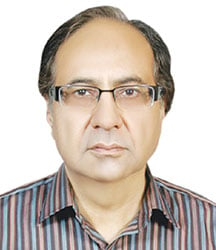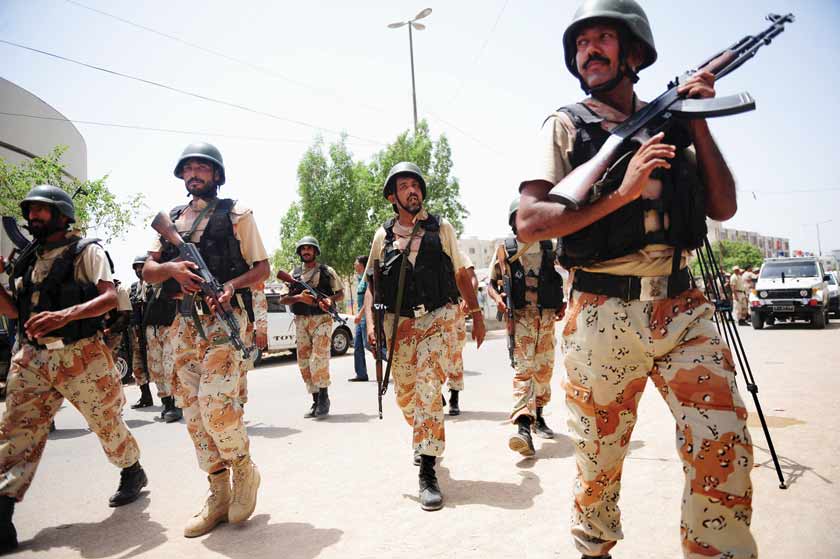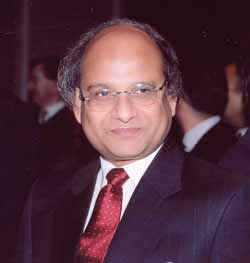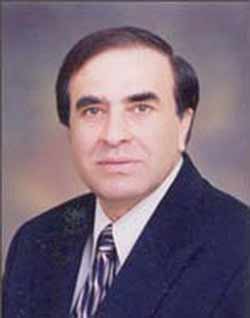The ongoing standoff between the centre and the Sindh government over the issue of extending powers to the rangers is sending negative vibes to the business community,
The ongoing standoff between the centre and the Sindh government over the issue of extending powers to the rangers is sending negative vibes to the business community, which wants an early resolution of the problem before it is too late.
Karachi generates over 65 percent of Pakistan’s revenue by contributing 64.97 percent and 62.79 percent direct and indirect taxes respectively. There is a greater consensus today that the targeted operation being conducted by the rangers against target killers, extortionists, kidnappers, and the terrorists has brought about 90 percent peace and tranquillity in Karachi. And by making rangers and the National Action Plan controversial, no individual or a political party is doing any service to the Karachiites who are sick and tired of violence, lawlessness, and insecurity in the city.
 From the traders’ community to the industrialists and exporters, all are hailing the performance of the rangers for restoring peace in Karachi and are vigorously demanding the continuation of the targeted operation against the criminals and anti-social elements.
From the traders’ community to the industrialists and exporters, all are hailing the performance of the rangers for restoring peace in Karachi and are vigorously demanding the continuation of the targeted operation against the criminals and anti-social elements.
If one goes through the recent statements of head of the traders committee, Atiq Mir, present and ex-chairmen of the All Pakistan Federation of Chambers and Commerce, former and current chairmen of All Pakistan Textile Mills Association, and the chairmen of Bed wear association, all are disturbed over the deepening differences between the federation and its federating unit. They say in one voice that Karachi operation must continue till the time all its major objectives are achieved and the matter brought to its logical conclusion.
After a long time, the concerned government officials claim the flight of capital has stopped from Karachi which was close to $25 million per month until recently. There is no dispute that the Karachi operation has provided the required confidence to the business community, and the local and foreign investors who were said to be bringing their investment back and pledging to contribute in the Pakistani economy in a bigger way.
But then the faceoff happened as the Sindh government, which was earlier fully supporting the Karachi operation with Pakistan Peoples Party co-chairperson Asif Ali Zardari taking pride in his Chief Minister Qaim Ali Shah as being the Captain of the ship, decided to confront the centre.
Since the meeting between the Sindh chief minister and the prime minister did not help resolve the issue last week in Islamabad, the provincial government is threatening not to endorse the Ranger’s power after 60 days for which the centre has used its authority by invoking the anti-terrorist act of 1997. Shah has been asked to coordinate with Interior Minister Chaudhry Nisar Ali Khan to resolve the issue.
Sindh maintains that the 18th amendment gives powers and the authority to maintain law and order, and other security issues; hence the adoption of the resolution by the provincial assembly to curtail the powers of rangers is very much in line with the Constitution. And therefore, the federal government must allow Sindh to act accordingly, especially by directing the rangers’ director general to seek prior permission from the chief minister to start any investigation against corrupt elements, including against former advisor on petroleum Dr Asim Hussain, the right hand man of the former President Zardari. Hussain is also facing terrorism related charges for allegedly providing treatment to over 200 terrorists and criminals in his two hospitals.
“We don’t know how will this standoff between the centre and Sindh resolve, but I only know and can claim on behalf of the businessmen, industrialists, exporters and the civil society that they all want peace and wish all the success to rangers and the Army Chief Gen Raheel Sharif to continue reining in terrorists, extortionists, kidnappers, corrupt mafias and religious extremists who preach hatred,” said a prominent Karachi businessman, Shabbir Ahmad.
Ahmad, who is also the chairman of the Bed wear export association, said foreign investors doing business in collaboration with their local counterparts are highly worried over the current state of affairs between the federal government and the Sindh government. “I am in contact with my foreign counterparts, who may revise their plans to work with us in case the army and the rangers are forced to curtail their activities in Karachi,” he said.
“Industrialisation that has picked up after a long time in Karachi and Sindh will stop, rendering thousands of people jobless, if God forbid, wings of the rangers are clipped in the name of the so-called provincial autonomy,” the articulate chairman of the association said.
Exports are already down, and the concerned quarters do not believe the government could manage even $22 billion at the end of the current financial year, let alone $26 billion exports during that period. No doubt because of the rangers operation, the business climate has significantly improved in Karachi and unlike the past, people are no more heavily investing in the stock market and real estate. They are again returning towards industrialisation by gradually bringing back their investment from various foreign destinations, including Malaysia, Sri Lanka, and Turkey.
Since the exports are very critical for the overall development and progress of the country, reduction in the power tariff by Rs3 per unit for the industry, announced by Prime Minister Nawaz Sharif, will certainly help gear up business activities, especially to reinvigorate the export industry. The increasing power tariff was a serious issue for the industry and has rendered costs of production higher than the regional economies.
The upward revision of the power and gas tariffs for the industrial sector every now and then eventually hurts productivity, and hence raises questions over the poor performance of the industry and other macroeconomic indicators.
While the cut in the power tariff is being hailed, the exporters are also urging the prime minister and the finance minister to get their close to Rs150 billion sales tax refunds released by the Federal Board of Revenue (FBR).
It is in everyone’s common knowledge that the exporters are facing a liquidity crunch because of their stuck up funds with the FBR. They are unable to meet their export orders due to the withholding of their refunds by the FBR. The prime minister appears to be supportive of the exporters, which was quite evident when he visited Karachi last week and attended the 39th annual export awards distribution ceremony. In addition to refunds, the exporters have also been demanding the downward revision of the rupee, which they believe is over-valued and causing problems to effectively compete with other countries, especially those of the region. Generally independent economists and analysts seem to be agreeing with the exporters and calling for some reasonable parity between the dollar and rupee.
Talking about exports, the prime minister is said to have recently made a joke with Commerce Minister Khurram Dastgir when he said to him, “I had asked you to double exports, but instead you have doubled your own self.”
The World Bank and the International Monitory Fund (IMF) have been urging the successive governments to play their due role to help ease of doing business in terms of extending all the required infrastructure support to the businessmen and the local and foreign investors.
Besides the falling exports, piling of the total stock of external debt and liabilities (EDL) at $65.2 billion on end-June 2015 as opposed to $40.3 billion on June 2006 is fast becoming a matter of serious concern for everybody.
According to renowned economist Dr Asfaque Hasan Khan, EDL grew at an average of 1.4 percent per annum during 2000-07 but its growth accelerated to an average of 6.2 percent per annum during 2008-15. “Pakistan added $29 billion in its external debt since 2000, of which $3.76 billion was added during 2000-2007 while the remaining $24.9 billion was added during 2008-2015,” he said.
What is more frightening, he pointed out, is the fact that two-third ($42.2billion) of the total stock of EDL amounting to $65.2 billion was added during the decade of 1990s and during 2008-15 (which is $17.3 billion and $24.9 billion respectively. “This simply means that two-third of the debt accumulated in 18 years, and the remaining one third ($23 billion), was accumulated in the remaining 50 years,” the noted economist said, who is currently the Dean and Principal of Social Sciences in National University of Science and Technology (NUST).
He expressed concerns over the reckless borrowing of successive governments, particularly those of the Pakistan Peoples Party (PPP) and the Pakistan Muslim League-Nawaz (PML-N), and said the speed with which this is being done, would ultimately land Pakistan into serious troubles. Recently, a Pakistan Muslim League-Nawaz Senator has also warned by saying that when the country’s external debt and liabilities would reach $70-75 billion, foreign lenders would ask for rolling back Pakistan’s nuclear programme.
Dr Khan blamed both the borrowers and lenders and said that the World Bank and the IMF are especially partners in crime, and never objected to reckless and uncalled for borrowing both by the PPP and PML-N.
“But my biggest concern is the change of definition of debt by the present government, as it did earlier to the revenue, expenditure and budget deficit to hoodwink the people of Pakistan. This is why I ask the finance minister to stop finding statistical solutions to genuine economic problems, and that the economic problems must be addressed through economic policies and not through manipulation of statistics which I also maintain is an accounting terrorism,” the noted economist said.
Part of the problem is that the economic team, led by Dar, vehemently disagrees with all the prominent economists and experts, including former Advisor on finance in the Second PML-N government Dr Hafeez Pasha, former governor State Bank, Shahid Kardar, former finance minister Dr Salman Shah and former central bank governor Dr Yaqub (now seriously ill), former advisors to the ministry of finance, Dr Ashfaque, Sakib Sherani, Akbar Zaidi, Dr Shahid Siddiqui and many others. They all ask the government to turn around the economy without indulging in rhetoric.
The foremost issue is how to bridge the gap between the income and expenditure, which is over Rs1 trillion, and needs to be curtailed by doing away with the all unnecessary non-development expenditures. This can only be done by honestly trying to find out the decades old new resource mobilisation, which includes taxing the rich agriculture gentry that earns billions but is unprepared to pay even millions.
The government may continue to disagree with the independent economists, but must not disagree with its own governor of central bank, the worthy Ashraf Mehmood Wathra who in the SBP annual report made a balanced assessment of the economy. Wathra deserves all praise and appreciation for exercising his autonomy to discussing some of the harsh realities. The report speaks volumes about the declining exports, challenges being faced by the industrial sector, warned the banks concentration on credit to the corporate sector, and covered all the aspects of the economy. The annual report of the SBP had been largely appreciated by the newspapers in their editorials.
The way ahead for the government is to take into account the central bank report and remove distortions from the economy so as to have some genuine increase in GDP growth and improvement in other economic indicators.
The writer is a senior journalist based in Islamabad
 “Pakistan added $29 billion in its external debt since 2000, of which $3.76 billion was added during 2000-2007 while the remaining $24.9 billion was added during 2008-2015. What is more frightening is the fact that two-third
“Pakistan added $29 billion in its external debt since 2000, of which $3.76 billion was added during 2000-2007 while the remaining $24.9 billion was added during 2008-2015. What is more frightening is the fact that two-third
($42.2billion) of the total stock of EDL amounting to $65.2
billion was added during the decade of 1990s and during 2008-15 (which is $17.3 billion and $24.9 billion
respectively.”
Dr Asfaque Hasan Khan Dean Social Sciences NUST
 “I am in contact with my foreign
“I am in contact with my foreign
counterparts, who may revise their plans to work with us in case the army and the rangers are forced
to curtail their
activities in Karachi.
Industrialisation that has picked up after a long time in Karachi and Sindh will stop,
rendering thousands
of people jobless,
if God forbid, wings
of the rangers are clipped in the name
of the so-called
provincial autonomy.”
Shabbir Ahmad
Chairman Pakistan
Bedwear Exporters Association